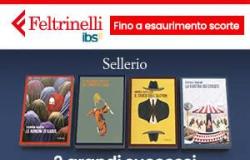The Director of the archaeological excavations of Pompeii presents his book and talks with the students. Readings by Agostino Chiummariello
On the morning of April 30, 2024, the Institute of Higher Secondary Education “Quintus Horace Flaccus” of Portici hosted the Director General of the Pompeii Archaeological Park, as well as an internationally renowned archaeologist, Gabriel Zuchtriegel. Organized as part of the “Words Inside” event, the meeting was held with the enthusiastic participation of students who demonstrated interest and involvement in the topics covered. The former director of the Archaeological Museum of Paestum was duly introduced by the Headmaster, Professor Iolanda Giovidelliand by prof. Maurizio Bugnowho served as moderator.
“Explaining a work of art, an ancient city or an entire culture is like planting a seed. You can perfect the techniques, you can water it, fertilize it, surround it with attention. But to be successful you also need something else: fertile soil, that is, the ability of the listener to make this seed grow. Without it, any effort becomes futile. […] We have to start from ourselves. That’s why, in this book, I decided to open the bonnet: Using the example of Pompeii, I tell you what drives an archaeologist like me to dedicate herself wholeheartedly to this place“. These are the words taken from the incipit of the book “Pompeii, the enchanted city” chosen to begin the conference; the actor plays them Agostino Chiummariello.
Among the memories of a past to be discovered and preserved, evoked by Zuchtriegel with competence and passion, ample space was also dedicated to music and the visual arts: the soprano Raffaella Ambrosino and her son Andrea with “The Sound of Silence”, Andrea Pastina at the piano ei Tableaux vivants (“living paintings”) of the students contributed to making the atmosphere of the day “enchanted”.
On the sidelines of the meeting, the Director of the archaeological excavations of Pompeii granted an interview to the microphones of Istici24.
In the book he explains how he moved from the direction of the archaeological park and the National Archaeological Museum of Paestum to that of the archaeological excavations of Pompeii. What does Pompeii have more than Paestum and other archaeological sites?
“It is not a quantitative question, but a qualitative one. Pompeii is certainly a great challenge for protection, for conservation, because it is an extremely vast and fragile heritage. We often feel a little alone, there is no model for Pompeii. Paestum can look at how it is done in Athens, Agrigento, Selinunte, in short, there are other sites with similar characteristics. Pompeii is truly unique, so we are forced to find the solutions that no one else is able to find. Furthermore, Pompeii is a site that provides a kind of photograph, a very unusual documentation for that period of a Roman city and of daily life in all its aspects”.
In the second chapter he deals with the double thread between religion and art, explaining how art has always had a purely religious function in antiquity. In today’s society there is no longer any form of ritual, art is a commodity like any other: what sense do Pompeii and art have today in a commodified society in which everything is usable and accessible?
“I think that even in ancient times there was a tendency towards the commodification of art, on the other hand even today art has something sacred, it is not completely a commodity. Art makes no sense without a larger dimension, I believe that many artists live their experience this way. So Pompeii, in this sense, is an invitation to recover something that perhaps we have forgotten a little and thought we could overcome but which is always there: the sacredness of art”.
Undoubtedly the ancient world speaks to the present: is there any value that it would like to recover from Roman society?
“A very important value in ancient Rome, which may not seem very current, is a certain sense of modesty, of shame. Today social media is a bit of a world without shame, without brakes, without a sense of privacy. We need to reflect on the direction in which this exponential communication, including details of our lives, on social media is taking us.”







